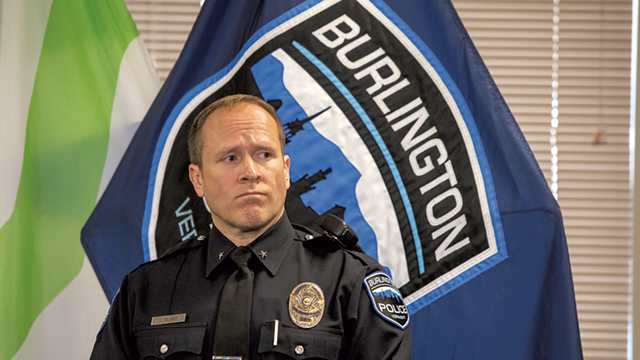
- File: Luke Awtry
- Acting Police Chief Jon Murad
When a gunshot rang out in Burlington's City Hall Park at 2:45 a.m. on June 5, the four police officers assigned to patrol the city's downtown had just clocked out. Two of the four remaining patrol officers on duty in the city were occupied with a call about a "suspicious event" two miles south at Oakledge Park. The other two officers were patrolling elsewhere in the city, far enough away that they didn't hear the shot, which missed its intended target and hit an uninvolved bystander.
Two witnesses later told police that they didn't immediately call 911 because they assumed officers were stationed downtown at that hour, as they had been for years.
But that morning — and every Saturday and Sunday during the month before — no officers were deployed downtown between 2:45 and 7:30 a.m., a period of time that is part of the so-called "midnight shift." In a press release about the shooting, acting Chief Jon Murad blamed the staffing arrangement on the department's dwindling roster, which has dipped from 90 to 77 active cops since the city council voted last year to reduce the size of the force through attrition.
What Murad didn't say was that he chose not to staff downtown, an area that a Seven Days analysis found has had the highest call volumes during the weekend overnight hours. Even during the pandemic, when nightlife ground to a halt, cops were called downtown in the wee hours of the morning more often than anywhere else in the city.
In response to requests from Seven Days, the department last week released patrol schedules for July and August. No one was scheduled to patrol downtown during the midnight shift on weekends in July, even as tourists return to Burlington and nightlife reopens. One officer was scheduled to patrol the city center during that time in August.
But on Monday, in response to several emailed follow-up questions, Murad released a new schedule, beginning July 4, that posts one officer downtown on a new overnight swing shift on Friday and Saturday nights. The chief, who declined a phone interview with Seven Days on Monday, did not respond to an email asking why he made the change.
The debate over police staffing continues, but largely missing from that conversation is whether Murad — who wants to be the city's permanent police chief — is making the most of the officers he already has.
Councilor Jane Stromberg (P-Ward 8), who serves on the council's Public Safety Committee, said she thinks Murad is using incidents such as the park shooting to scare people into believing the city is less safe with fewer cops.
Asked whether the department should rethink its staffing assignments, Stromberg replied, "I know they have the ability to do that. Whether they choose to or not is unfortunately seeming more political than realistic."
The department's July schedule had divided cops into three shifts — days, evenings and midnights — but the newly released July schedule adds two "swing shifts," one during the day and one overnight. The new 8 p.m. to 6 a.m. shift assigns an officer to the downtown area on weekends.
The midnight shift, which starts at 9:30 p.m. and goes until 7:30 a.m., had become central to the city's policing debate. When councilors proposed to cap the department at 74 officers last June, Murad warned that he'd have to end the midnight shift or reduce daytime staffing. He reprised the issue at a press conference last December, saying that officers would no longer be "proactively patrolling the streets" between 3 and 7:30 a.m. if the number of officers dropped to 76. Cops would still be on duty, Murad said, but they'd be assigned to the station and would only respond to the most serious calls.
The shift "is not something that we are thinking about ending lightly," Murad said then. "This is a serious move."
Murad has also criticized councilors for making cuts without also creating another way to provide public safety. Last winter, he proposed adding to the force unarmed civilians who would handle nonemergency calls — a plan that councilors universally embraced and that is now under way. But Murad also made clear that he'd rather have a force of 96 cops, the previous average staffing level before the council vote.
On the campaign trail, Mayor Miro Weinberger, who was running for reelection in March, frequently invoked the council's police vote and its threat to overnight coverage. Earlier this year, when Progressive councilors shot down the mayor's proposal to increase the department's staffing cap to 84 officers, Weinberger said they were welcoming a "crisis."
Meantime, the police roster has dropped to 77 officers, just one shy of the number Murad said would endanger overnight coverage. In May, he announced a new "priority response plan" for triaging calls. It keeps officers out on patrol but directs them to respond only to urgent situations in which the public is at risk, such as domestic assaults and robberies. Lower-priority calls for vandalism and public intoxication, for instance, would have to wait.
"If we continue to lose officers, the Priority Response Plan may not be sufficient to maintain the balance between decreasing headcount and increasing calls for service," Murad said in an email Monday. "Other measures may be necessary."
Every year since 2013, the majority of calls on the midnight weekend shift have come from downtown — the area bounded by South Union, Pearl and Maple streets, and the waterfront. In January 2021, when pandemic restrictions were still in place, Murad assigned five officers and a supervisor to the weekend overnight shift, covering every area of the city. But between May 2 and June 5 — the night of the shooting and as the city began to reopen — Murad assigned officers to patrol every area except downtown during those hours.
That month, an officer was assigned to the South End, which has had half the call volume as downtown on weekend overnights during the last decade, Seven Days' analysis found. The largely residential New North End had coverage, even though it has consistently had the fewest calls of any neighborhood. Both the Old North End and Hill Section have had fewer calls for service, but they, too, had an officer nearby.
Until Monday, police schedules showed that no officer would be on duty in the city center throughout July between 2:45 and 7:30 a.m. The new schedule shows that there will be one officer there from 2:30 to 6 a.m. It's unclear what the schedules will look like for the rest of the year.
In an interview on June 14, Murad said he doesn't have enough officers to consistently staff the downtown. The department once had foot patrols and a separate street crimes unit to help handle the rowdy bar crowd there, but, Murad said, "we don't have anywhere near the numbers necessary to do something like that anymore."
Asked if he would reconsider downtown staffing, especially now that bars are open late, Murad said he's "looking at every avenue available ... to maintain a level of service and safety that the city expects." But he didn't answer directly when Seven Days asked whether that included bolstering downtown staffing in the early morning hours. When pressed, Murad became defensive, asking if this reporter was suggesting that cops take extra shifts. He also noted that when the midnight shift is short-staffed, the patrol beats are split into "north and south" instead of area assignments.
Murad said he can't simply redeploy officers downtown, because other parts of the city also need service overnight. The police union contract also allows officers to indicate their preferred shift and patrol area. Though the area assignments can change daily, Murad said, supervisors prefer to keep officers on a familiar beat.
"Officers are on a shift that they choose, and that's how the shift structure works," he said.
In an interview on June 16, before the schedule changed, Weinberger said he was concerned about having fewer cops downtown with the return of nightlife. At the same time, the mayor said he doesn't question Murad's judgment. He praised the chief for preserving 24-7 overnight coverage, saying Murad is "doing the best he can with the resources he has."
"I have no reason to second-guess that he is deploying the officers, at this point, in a way that makes the most sense," Weinberger said, adding that Murad's staffing scheme would ensure the community is safe.
Police Commission chair Jabulani Gamache has worked for 10 years as a bartender at Manhattan Pizza & Pub, across Main Street from City Hall Park, where the shooting took place. He said the weekend bar crowd has usually dispersed by 2:45 a.m., but he'd still like to see a cop patrolling the area after that time.
Gamache, though, was skeptical whether a police presence can really deter serious crime.
"Properly staffed or not," he said, the park shooting "probably would have happened regardless."
Indeed, there have been shootings downtown even when the department had a full roster. In 2015, a man was fatally shot on lower Church Street just after bars closed. In 2018, a woman was struck by a bullet outside Nectar's in the early morning hours.
Councilor Stromberg said she thinks Murad has tried to blame more recent shootings on low staffing levels. She argues that he uses the incidents "as a pulpit" to slam councilors for reducing the force. In a press release about gunfire in the Old North End in March, for instance, Murad emphasized that his officers were overwhelmed with other calls. When shots were fired at a large Hill Section college party in late May, Murad's press release noted that the department was "short staffed and stretched."
"The way that he has crafted this narrative around there not being enough police officers to prevent something like that, I think, is complete BS," Stromberg said. "It really is such a scare tactic."
Murad's message has resonated with some. Jeff Nick, the chair of the Church Street Marketplace Commission, blames the council for the lack of a police presence downtown. He said some business owners have told him that staff are scared to walk to their cars alone at night.
"They're not increasing the police budget, and they've got gunshots going off at City Hall Park at night," Nick said. "It's unbelievable that there's not a sense of, 'All hands on deck, let's keep the public safe.' There doesn't seem to be that dialogue going on."
The council hasn't revisited the staffing discussion since earlier this year. Instead, the body hired a consultant to study police operations and suggest incidents that could be handled by civilian staff, such as the unarmed social workers Murad had proposed. The report was originally due this month but has been delayed until fall.
The council hasn't budgeted for more officers, at least for this coming fiscal year. On Monday, councilors unanimously approved a 2022 spending plan that cuts the police budget by 5 percent.
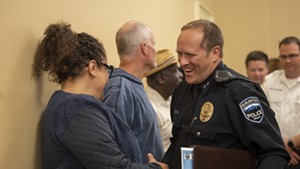
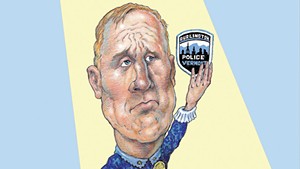
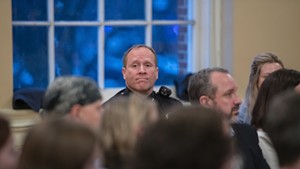
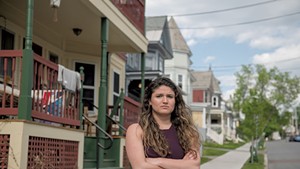
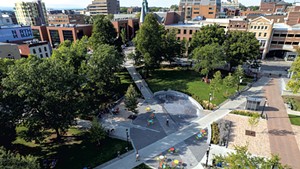









Comments
Comments are closed.
From 2014-2020, Seven Days allowed readers to comment on all stories posted on our website. While we've appreciated the suggestions and insights, right now Seven Days is prioritizing our core mission — producing high-quality, responsible local journalism — over moderating online debates between readers.
To criticize, correct or praise our reporting, please send us a letter to the editor or send us a tip. We’ll check it out and report the results.
Online comments may return when we have better tech tools for managing them. Thanks for reading.